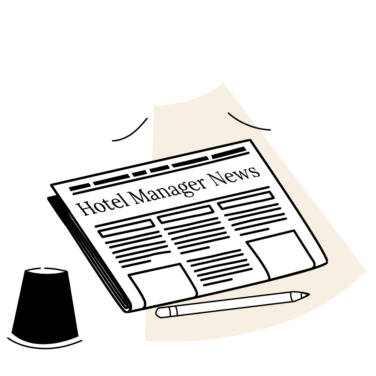Running a hotel is like conducting an orchestra—every part has to work in harmony, or the whole tune falls apart. I’ve been in this business for years, seeing everything from bustling holiday seasons to quiet midweek lulls.
What keeps a hotel running smoothly through it all isn’t just fancy furniture or top-notch amenities; it’s the skills of the people managing it. Hotel management is an art that blends organization, leadership, and an eye for detail.
In this article, I’m going to share the key skills that every great hotel manager needs to succeed and keep the doors open with happy guests streaming in.
What is a Hotel Manager?
A hotel manager is the person who oversees all the operations of a hotel. They are in charge of making sure the hotel runs smoothly and that guests have a pleasant stay. Their responsibilities include managing the staff, ensuring rooms and facilities are clean and well-maintained, and handling guest complaints or special requests.
Hotel management also looks after the budget, track expenses, hires hotel staff, and work to make the hotel profitable. They are often the face of the hotel, setting the tone for the guest experience.
What Makes an Effective Hotel Manager?
An effective hotel manager is organized, people-focused, and adaptable. They need strong leadership skills to manage and motivate their team.
Hotel management tip: Communication is key, as hospitality managers deal with staff, guests, and sometimes vendors or elite business partners.
Good problem-solving abilities are essential to handle unexpected situations, such as maintenance issues or guest complaints. A great hotel manager also has a keen sense of hospitality, ensuring guests feel welcomed and valued. There are plenty of hotel management tips and tricks you can leverage to make each guests' stay unique. They stay calm under pressure and can make quick decisions to keep operations running smoothly.
You can start to gauge hotel management effectiveness with targeted interview questions about leadership, enthusiasm, and composure under pressure.
What is Hotel Management All About?
Hotel management is all about ensuring a hotel operates efficiently and guests have a positive experience. It involves planning, coordinating, and overseeing all hotel activities. This includes managing the front desk, housekeeping, maintenance, and any special services like spa or dining facilities.
Hotel management is also about meeting financial goals. Managers must budget wisely, control costs, and maximize profits while maintaining quality service. They play a key role in setting standards for the hotel and making sure those standards are met by all employees.
Essential Hotel Manager Skills According to an Expert
Being a hotel manager requires a diverse set of skills to handle daily challenges and provide exceptional guest experiences. The more demonstrable hospitality skills you have, the higher your salary as a hotel manager will be.
Here are the skills I look for in a qualified hotel manager:
1. Communication skills
Strong communication skills are vital for hotel managers to ensure clear and effective exchanges between all parties involved. This includes giving precise instructions to staff, facilitating productive meetings, and maintaining professional conversations with guests.
Effective communication ensures that messages are understood, issues are addressed promptly, and the overall atmosphere remains positive and efficient. A hotel manager who communicates well can avoid misunderstandings, improve team morale, and enhance guest satisfaction.
2. Problem-solving
Problem-solving skills are critical for hotel managers because unexpected challenges can arise at any moment, such as guest complaints, scheduling conflicts, or equipment failures. A good hotel manager quickly identifies the root of the problem, evaluates potential solutions, and implements an effective strategy to resolve it.
This proactive approach not only helps maintain smooth operations but also builds trust with staff and guests by demonstrating competence and reliability under pressure.
3. Teamwork
Teamwork is essential for hotel managers as they coordinate with different departments and team members to deliver consistent and seamless service. This means working collaboratively with hotel housekeeping, front desk staff, kitchen teams, and maintenance crews.
A manager who fosters teamwork creates a cooperative environment where everyone feels valued and motivated to contribute to the hotel’s success. Good teamwork results in a well-coordinated operation that benefits staff cohesion and guest experience alike.
4. Effective communication
Effective communication goes beyond simple interactions; it involves active listening, clear articulation, and the ability to provide feedback constructively. Hotel managers who excel at effective communication ensure that their team members understand their roles, expectations, and any updates to procedures.
This minimizes errors, promotes transparency, and boosts overall productivity. Effective communication also aids in guest interactions, making them feel heard and valued, which contributes to positive reviews and repeat business.
5. Financial management
Hotel managers need strong financial management skills to handle budgeting, cost control, and revenue optimization. This includes understanding profit margins, tracking expenses, and making informed decisions to increase profitability without compromising quality.
A manager proficient in financial management can effectively allocate resources, plan for high and low seasons, and ensure the hotel’s long-term financial health. This skill is also crucial for negotiating with suppliers and making strategic investments in hotel upgrades or marketing initiatives.
6. Interpersonal skills
Interpersonal skills are the foundation of building strong, trusting relationships with both staff and guests. Hotel managers who are approachable and personable can foster a positive work environment where employees feel respected and motivated.
These skills also enable managers to handle guest complaints gracefully, turning potentially negative situations into opportunities for demonstrating excellent service. Interpersonal skills encourage loyalty, reduce staff turnover, and enhance the overall atmosphere of the hotel.
7. Multitasking
The ability to multitask allows hotel managers to juggle multiple responsibilities effectively, which is crucial in the fast-paced hospitality environment. From supervising check-ins and responding to guest requests to ensuring room readiness and handling staffing issues, multitasking helps managers maintain control over various aspects of the operation.
Good multitasking skills also reduce stress by allowing managers to stay organized and prioritize tasks, ensuring that critical operations run smoothly.
8. Time management
Effective time management is vital for hotel managers to ensure that daily tasks are completed efficiently and deadlines are met. This involves creating schedules, prioritizing responsibilities, and avoiding time-wasting activities.
Good time management ensures that managers can address the needs of guests, oversee staff activities, and handle administrative duties without falling behind. It leads to a more organized work environment and enhances the hotel’s overall service delivery.
9. Customer service skills
Customer service skills are at the heart of a hotel manager’s role, as they are essential for making guests feel welcomed, valued, and well cared for. These skills include handling guest complaints diplomatically, anticipating guest needs, and ensuring that each visitor leaves with a positive impression.
Excellent customer service leads to high guest satisfaction, positive reviews, and repeat business, which are critical for a hotel’s reputation management strategy and overall success.
10. Emotional intelligence
Emotional intelligence allows hotel managers to understand and regulate their own emotions while being sensitive to the emotions of others. This skill helps in managing stress, empathizing with employees and guests, and making informed decisions during high-pressure situations.
Managers with high emotional intelligence can better motivate their staff, defuse conflicts, and create an atmosphere of mutual respect, contributing to a harmonious work environment and better guest relations.
11. Hospitality skills
Hospitality skills are the core of creating a welcoming environment where guests feel comfortable and attended to. These skills include greeting guests warmly, remembering repeat visitors, and going the extra mile to make stays special.
A hotel manager with strong hospitality skills sets the tone for the rest of the staff and ensures that guests have a memorable experience that encourages them to return and recommend the hotel to others.
12. Leadership skills
Leadership skills are crucial for hotel managers to inspire, guide, and empower their teams. A manager with strong leadership qualities can set a clear vision, motivate staff, and lead by example. Effective leadership helps build a cohesive team that works efficiently to achieve the hotel’s goals.
Managers who demonstrate good leadership foster trust and loyalty among employees, creating a stable and motivated workforce that contributes to high service standards.
13. Organizational skills
Organizational skills help hotel managers maintain order and structure within their daily operations. These skills include managing schedules, overseeing housekeeping, coordinating events, and ensuring that all departments are aligned.
A well-organized manager can streamline processes, reduce errors, and improve the overall efficiency of the hotel. This leads to a more seamless guest experience and a better working environment for staff.
14. Adaptability
Adaptability is a key skill for hotel managers, as the hospitality industry is dynamic and full of surprises. Whether it’s handling last-minute booking changes, responding to staff shortages, or adapting to new technologies, managers need to stay flexible.
Being adaptable allows managers to find quick solutions and maintain service quality, no matter the challenge. This resilience ensures that operations continue smoothly and that guests receive a consistent level of care.
15. Empathy
Empathy enables hotel managers to connect with guests and staff on a human level, understanding their perspectives and addressing their concerns effectively. An empathetic manager can better support their team, foster a positive work environment, and handle guest complaints with compassion.
This leads to stronger relationships, higher job satisfaction among employees, and a better overall guest experience.
16. Attention to detail
Attention to detail allows hotel managers to ensure that every aspect of the hotel meets high standards, from the cleanliness of rooms to the accuracy of guest reservations. This skill helps managers catch small issues before they escalate, ensuring that guests receive flawless service.
Attention to detail is also essential for maintaining the hotel’s image and reputation, as guests often notice and appreciate the little things.
17. Industry knowledge
Having deep industry knowledge helps hotel managers stay informed about current hospitality management trends, best practices, and new technologies in hospitality. This knowledge allows them to make strategic decisions that keep the hotel competitive and up to date. A manager who is well-versed in industry developments can also anticipate guest expectations and adapt services accordingly, ensuring a high-quality experience.
Industry knowledge may include experience with dedicated hotel management software, including specific hotel management system features like inventory management, facility management, booking engines, and distribution channels.
18. Operational and financial management
Operational and financial management skills are necessary for hotel managers to handle the complex logistics of running a hotel. This includes scheduling staff, managing supply chains, tracking revenue, and budgeting for marketing and upgrades. Managers who excel in these areas can ensure that daily operations run smoothly while also focusing on long-term growth and sustainability.
Pick Up New Hotel Management Skills Now
I am a huge advocate for continuous learning, whether this is mandated by your company or not. As a hotel manager, you should always belooking to level-up essential knowledge and skills, as well as to stay abreast of important hospitality trends and news.
Here are some easy L&D opportunities for hotel manager that I recommend:
- Sign up for hospitality newsletters by industry experts or hotel chains that you admire and wish to emulate. This is an easy and free way to learn a little bit every day (or week).
- Join hospitality communities online or in your area. These are great for meeting people in the industry and surrounding yourself with positive role models (and maybe even a mentor).
- Attend hospitality events and conferences if you are able. You can attend sessions on topics that interest you, as well as do some serious networking from hospitality folks around the globe.
- Listen to hospitality podcasts! This is such a simple way to turn your morning and evening commute into something more productive and fulfilling.
- Read hospitality management books, particularly ones with essential evergreen knowledge about the history of the industry and big brand names that have made their mark.
- Run your hotel management resume through an AI service like ChatGPT and ask it to list hard and soft skills that you are currently missing. Focus on building those skills in the upcoming year.
- Take a hotel management course to not only learn new things, but to add certifications and qualifications to your resume and LInkedIn.
How to Hire the Best Hotel Manager?
Hiring the best hotel general manager involves looking for specific traits and experience. Start by defining the qualifications needed, such as past hotel management experience, leadership skills, and familiarity with hotel software or management tools.
During interviews, ask candidates about real-life situations where they had to solve problems or manage a crisis. It’s important to test their knowledge of guest service and employee management. References from previous employers can provide insight into their past performance. Choose someone who is not only experienced but also passionate about hospitality and capable of connecting with both guests and staff.
Interview Question Examples
In an interview, you can check for these qualities with pointed questions like:
- Can you describe a time when you faced a significant challenge in hotel operations? How did you approach solving it?
- How do you ensure guest satisfaction while maintaining hotel policies and procedures?
- What strategies do you use to manage and motivate your team, especially during high-pressure periods?
- Can you share an example of a successful marketing initiative you implemented that improved hotel occupancy rates?
- How do you handle feedback from guests or employees that is critical of your management or the hotel's services?
- What experience do you have with different types of hotel management software, and how do you leverage technology to streamline operations?
- Describe a time when you had to resolve a conflict between staff members. What was your approach and what was the outcome?
- How do you stay updated on industry trends and implement new practices to keep the hotel competitive?
Hotel Management Skills: FAQ
Whether you're aiming to understand industry dynamics or refine your strategic and financial practices, this FAQ offers valuable guidance.
What are the essential aspects to consider for a successful career path in hospitality management?
A successful hotel management career path often involves gaining diverse work experience, which helps professionals understand different roles and responsibilities in the industry. Certifications can significantly enhance a candidate’s profile by showcasing their expertise in specific areas such as hotel management or customer service.
Internships are critical as they provide hands-on learning opportunities and help bridge the gap between theoretical knowledge and real-world application. A clear career path with targeted goals and continuous skill development ensures steady professional growth in the hospitality sector.
What should be prioritized when managing hotel operations effectively?
Effective hotel operations require a comprehensive approach involving hospitality management, revenue management, and a focus on general management practices. A general manager plays a crucial role by overseeing the day-to-day operations, ensuring all departments work harmoniously, and maintaining high standards of service.
Operations managers are vital for optimizing resources and streamlining processes. Revenue management is essential to maximize profitability by forecasting demand and adjusting pricing strategies accordingly. Ensuring seamless day-to-day operations is fundamental to maintaining customer satisfaction and business success.
What skills and competencies are most important for success in the hotel industry?
In the hotel industry, having a blend of soft skills and a comprehensive skill set is essential. Important skills include problem-solving, communication, and leadership, which all contribute to effective management and customer satisfaction. Customer experience is a top priority, as ensuring guests have a positive and memorable stay can lead to repeat business and positive reviews.
Customer satisfaction is closely tied to how well the staff can address needs and issues promptly and professionally. Developing these competencies enhances overall service quality and operational efficiency.
What should one understand about the hospitality business and hotel industry landscape?
The hospitality business is a multifaceted sector encompassing various types of establishments, including hotels and motels. Understanding the hotel industry requires insight into the unique characteristics of different types of accommodations and the strategies needed to operate them successfully.
Familiarity with the broader hospitality business environment helps professionals adapt to market trends, guest expectations, and the competitive landscape. Staying informed about industry shifts can support better decision-making and sustainable growth in a fast-paced market.
What is the role of human resources in hotel management, and what job roles are most critical?
Human resources in hotel management play a pivotal role in recruiting, training, and retaining talent to ensure a high standard of service. Job descriptions are crafted to clearly outline expectations and responsibilities, which helps maintain organizational structure and efficiency.
The position of a successful hotel manager is vital, as this individual must lead by example, foster a positive work environment, and ensure that the team meets performance benchmarks. HR practices that align with business goals help sustain a productive and motivated workforce.
Why are forecasting and pricing crucial for hotel management?
Forecasting is essential in hotel management to anticipate future demand and make informed decisions about staffing, inventory, and marketing strategies. Accurate forecasting can help managers allocate resources effectively and prepare for peak seasons or events that may impact occupancy rates.
Pricing strategies are closely linked to revenue management, where setting optimal rates is key to maximizing profits without compromising customer satisfaction. A well-thought-out approach to pricing ensures competitiveness in the market while maintaining the hotel’s profitability.
What Next?
Don't forget to browse around the site for more great hotel management tips, templates, and tools. Plus, join The Hotel GM newsletter for expert tidbits sent right to your inbox!



